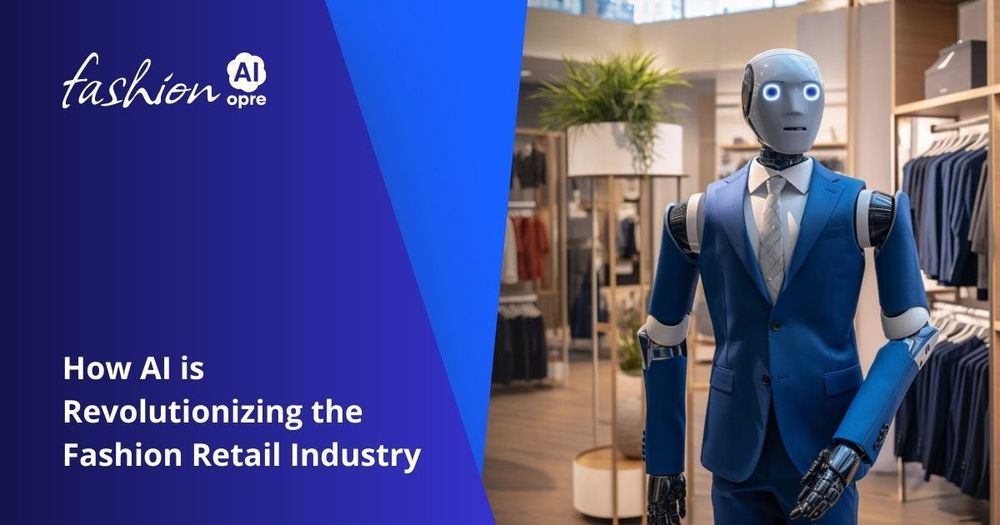
How AI is revolutionizing fashion retail!
The fashion retail industry is constantly evolving, driven by new trends, consumer demands and technological advances. One of the most significant technological advances in recent years is the rise of artificial intelligence (AI). AI is already transforming the fashion industry, from design and production to marketing and sales. This means retailers can directly improve efficiencies, ultimately leading to increased profits.
AI has the potential to revolutionize the way consumers buy clothing by helping retailers better understand their customers and provide personalized shopping experiences. This not only improves the shopping experience, but also increases customer loyalty.
The introduction of AI in the fashion retail industry has ushered in a new era of efficiency and innovation. As AI evolves, we can expect even more exciting developments in the industry.
A study by Deloitte found that retailers in Germany who invest in AI technologies can expect a 5-15% increase in sales and a 10-20% reduction in inventory costs.
In this blog article, we will explore how AI is being used in the fashion retail industry and the benefits it offers to both retailers and consumers. We will also look at some of the challenges associated with implementing AI in the fashion retail industry and consider the future of this exciting technology in the industry.
It's clear that AI is transforming the fashion retail industry, and those who integrate this technology now will be at the forefront of this revolution.
1. How AI is currently being used in the fashion retail industry.
The fashion retail industry has always been a fast-paced, ever-evolving industry, and with the rise of artificial intelligence (AI), it has become even more dynamic. AI is already being used in a variety of ways in the fashion retail industry, from predicting trends and personalizing recommendations to improving supply chain management and enhancing the customer experience. By analyzing big data, AI algorithms can identify patterns and predict future trends, allowing fashion retailers to make informed decisions about their collections and marketing strategies. AI-powered chatbots and virtual assistants can also provide personalized recommendations to customers, improving their shopping experience and increasing sales. In addition, AI can optimize supply chain management by predicting demand and ensuring products are available when and where they are needed. Overall, AI is revolutionizing the fashion retail industry by improving efficiency, customer satisfaction and innovation. As technology advances, we can expect more exciting developments in the future.
2. advantages of using AI for fashion retailers.
AI has revolutionized the fashion retail industry in many ways, and one of the most significant benefits is the ability to personalize the shopping experience for each customer.
A survey by Deloitte found that 43% of German consumers expect retailers to provide personalized recommendations based on their past shopping behavior, indicating a strong demand for AI-driven personalization in the market.
With AI-powered tools, fashion retailers can analyze customer data to understand their preferences, purchase history, and behavior patterns. This information can be used to create personalized recommendations, product recommendations and even personalized styling advice. AI can also help retailers optimize inventory management by predicting demand and optimizing stock. This not only helps retailers reduce waste and increase profitability, but also ensures customers can find the products they want, when they want them. In addition, AI-powered chatbots can provide 24/7 customer service, answering questions and resolving issues in real time. This improves the overall customer experience and helps retailers build stronger relationships with their customers. With all these benefits, it's no wonder that AI is fast becoming the must-have technology for fashion retailers who want to keep up with the competition and provide the best possible shopping experience for their customers.
3. Challenges to implementing AI in fashion retail.
Although AI has the potential to revolutionize the fashion retail industry, there are several challenges that need to be considered when implementing this technology. One of the biggest challenges is the lack of standardization of data in the fashion industry. With so many different brands, styles and sizes, it is difficult to create a unified data set that AI algorithms can use to make accurate predictions. Additionally, there is a risk of bias in AI algorithms, which can lead to inaccurate recommendations or even discrimination. Another challenge is the implementation cost of AI technology, which can be prohibitively expensive for smaller retailers due to inadequate strategy and preparation.
Despite these challenges, it is clear that AI has the potential to transform the fashion retail industry by improving the customer experience, optimizing operations and increasing sales. To overcome these challenges, retailers must work together to standardize data, eliminate biases in algorithms, and find cost-effective solutions for implementing AI technology, such as through custom AI-assisted development. By doing so, they can stay ahead of the competition and provide a personalized and efficient shopping experience for their customers.
4. The future of AI in the world of fashion retail.
According to a report by Statista, the revenue generated by AI-driven retail applications in Germany is expected to reach €1.1 billion by 2025.
As AI technology continues to advance, the future of AI in the fashion retail industry will be characterized by seamless integration, personalized experiences, and sustainability. Let's take a closer look at the future of AI in the fashion retail industry:
- Seamless integration: AI will be fully integrated into the fashion retail ecosystem, from design and production to marketing and sales. Retailers will be able to use AI-powered solutions seamlessly across multiple platforms such as e-commerce websites, mobile apps and social media channels. This will create a unified shopping experience for customers, allowing them to interact with brands in a personalized and intuitive way.
- Personalized experiences: AI will enable retailers to deliver highly personalized experiences to their customers. By leveraging customer data and insights, AI-powered solutions will be able to provide personalized recommendations, styling tips, and even customized products. This will enable retailers to connect more deeply with their customers and increase customer satisfaction and loyalty.
- Sustainability: AI will play an important role in driving sustainability in the fashion retail industry. By optimizing inventory management, reducing waste, and improving supply chain operations, AI-powered solutions enable retailers to minimize their environmental impact. In addition, AI can help companies create sustainable and ethical supply chains by providing full traceability and transparency.
- Collaboration: AI will enable collaboration between different stakeholders in the fashion retail industry. For example, AI-powered solutions can enable designers to collaborate more effectively with manufacturers, improving the speed and efficiency of the production process. In addition, AI can enable retailers to collaborate with customers and influencers to create more engaging and interactive shopping experiences.
Retailers that integrate this technology early on will have a competitive advantage in the marketplace and be able to provide better experiences for their customers. The future of AI in the fashion retail industry is exciting and it is important for companies to stay on top of the latest developments to stay relevant.
5 Conclusion.
The future of AI in the fashion retail sector is not only promising, but also an opportunity for retailers that leverage this technology. By using AI tools, retailers can optimize their business operations, make better decisions, and create personalized experiences for their customers. Retailers that start integrating AI into their business now have a significant advantage over their competitors. AI technology is rapidly evolving and early adopters have the opportunity to stay on top of the latest advancements in the field, so it's high time for fashion retailers to invest in AI technology and take advantage of its benefits to drive growth and innovation in the industry. The future of fashion retail is AI-driven, and those who refuse to embrace this technology risk being left behind. Whether you are a retailer, designer or manufacturer, there are many ways to get involved and shape the future of AI in fashion retail. So let's tackle these challenges together and take advantage of the opportunities AI already offers today. If you'd like to learn more about the potential of AI in Fashion Retail or discuss how you can integrate AI tools into your business, feel free to get in touch.

Services
Service
Pimcore
Tech Stack

© 2023 opre IT EOOD. All rights reserved.